by Yoshi Silverstein – JOFEE Fellowship Director May 18th, 2017 | 22nd Iyar 5777 | 37th day of the omer | gevurah she’b’yesod 16 Organizations. 17 Fellows. Over 500 programs. An estimated 37,000 participants in Jewish Outdoor, Food, Farming & Environmental Education (JOFEE) programs across the country. These are some of the incredible numbers emerging as we look back at our first JOFEE Fellowship cohort, who completed their closing seminar and siyum last week at our sister JOFEE organization, the Pearlstone Center outside Baltimore, MD. Behind those numbers are thousands of people encountering – many for the first time – the incredible power of a Jewish tradition steeped in deep cultural and spiritual connection with the earth, with place, with human communities and our surrounding ecosystems, with our food, and with each other. A Jewish tradition that recognizes both the limits and abundance of the resources our home planet provides for us. A tradition that says this world is amazing – there is so much magnificence – and yet we have work to do – not to complete by ourselves, but neither to desist from doing our part. And wow did our JOFEE Fellows do their part! Here are a […]
Topic: Jewish Greening Fellowship
This Passover, Take Action for the Climate – D’varim HaMakom: The JOFEE Fellows Blog
by Rachel Aronson – JOFEE / Sustainability and Community Engagement Fellow, Hazon Jews across the world this week commemorated leaving Egypt to become free people for the holiday of Passover. Friends and family sit around the table together for the seder, celebrating freedom with comfy pillows to recline on and lots of kosher wine. Unfortunately, Passover can also represent something else: the holiday of waste. Those who keep kosher for Pesach (Passover) deep-clean our kitchens before the holiday, rooting out bread, tortillas, muffins, crackers, and every other kind of chametz (leavened or yeasted products) that’s sitting around the house. And to ensure that everything is kosher, we switch out our regular sets of dishes with a special set of only-for-Passover dishes. But who wants to keep an extra set of dishes around the house? It takes up storage space. It’s inconvenient. Understandably, many of us – out of convenience, or out of necessity – use disposable plates, cutlery, cups, and more. Ironically, many of us end up celebrating this holiday of freedom and liberation with trash bags full of styrofoam. Thankfully, Passover is also a holiday that reminds us of our ability to make change — as individuals and as a society. […]
NY Finalizes Major Initiative to Expand Solar Access
From the Press Office of Vote Solar Diverse Coalition Applauds Cuomo Administration’s Commitment to Improving Community Health, Resiliency, Opportunity through Clean Energy Albany, NY – July 16, 2015 – Today the New York Public Service Commission (PSC) established an innovative Shared Renewables program that will expand consumer access to local solar, wind and other clean energy resources, particularly among low- and moderate-income New Yorkers. More than 70 local and national organizations join together in applauding state leaders for their commitment to a healthier, more resilient clean energy system that creates opportunities for all New Yorkers to thrive. “Solar is working for the Empire State in a big way. Record numbers of New Yorkers are harnessing sunshine to save on their energy bills, which is creating local jobs and reducing the need for traditional polluting power. This new program will empower even more communities, families and businesses to participate in that great solar success story,” said Sean Garren, Northeast Regional Manager for Vote Solar, a national solar advocacy organization. “We thank Governor Cuomo, his administration and the PSC for making equal access to solar a priority and for speeding our transition to a healthier, more resilient clean energy system.” New York […]

Shmita Galore!
“Something miraculous happens when we stop. We get to experience the power that nature knows called dormancy…” – Rabbi David Ingber, sermon on Shmita, Hazon’s Shmita Sourcebook This year, Jewish communities in New York — and all across the world — embraced the biblical concept of Shmita. And JGF institutions led the way. With the help of JGF alumni shmita grants, Fellows created a variety of programs and events that highlighted Shmita values like releasing debt, eating thoughtfully, and reducing waste. Local Food and Gardening One of Shmita’s core teachings is to let the land lie fallow every seventh year, encouraging us to become more in sync with the earth’s natural cycles. In keeping with this message, many institutions developed programs centered around local food and gardening. Garden cultivation relieves stress and anxiety and improves memory. At Jewish Home Lifecare’s Sarah Neuman Center, a horticulture therapist led a workshop on garden-to-table eating. Seniors learned to grow vegetables and herbs, which provided not only fresh produce, but also healing. The JCC of Staten Island hosted its first Shmita Seder, using the Passover seder format to educate participants about the connections between Jewish and environmental values. A specially designed “Haggadah” guide walked participants […]
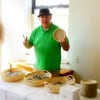
Raise a Glass to Greening: Creating a Sustainable Kiddush
Greening often happens in supply closets. On roofs. In the boiler room. Out of sight. To bring greening out of the shadows, it’s important to make it a visible part of your programming. For synagogues, weekly kiddushes offer the perfect opportunity to highlight greening work already underway and demonstrate that greening is a Jewish value. Kiddush, which means sanctification, was intended as a way to sanctify Shabbat and remind us to take a rest from our workday labors and enjoy the beauty of creation. But what could be a better way to sanctify the day than creating a healthier, less wasteful kiddush? Organizing a sustainable kiddush is an ideal first step for synagogues that have little experience in greening: it’s easier than a facility upgrade and requires less upfront effort and investment… but it can help the congregation get into better habits and build momentum for additional projects. For synagogues already steeped in greening, the kiddush – with its large, captive audience – offers an excellent opportunity to raise the profile of existing greening measures. Hosting a sustainable kiddush also provides a way to pilot changes in operations, testing their feasibility and congregants’ opinions as a springboard for broader change. […]
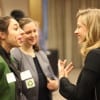
Leading Green!
At JGF’s Leading Green conference, held February 10th in collaboration with the Wiener Educational Center of UJA-Federation of New York, we celebrated the New York Jewish community’s response to climate change and gave practical tools to Jewish communal leaders interested in starting the greening process. The conference was a resounding success, with over 100 people in attendance from a broad range of institutions and greening backgrounds. Times of Israel covered the event. UJA-Federation of New York CEO Eric Goldstein, faith and climate scholar Karenna Gore, and solar entrepreneur Yosef Abramowitz praised the greening work undertaken by the Jewish community and encouraged the audience to continue their greening efforts. Wendy Seligson (14th Street Y), Aliyah Vinikoor (Jewish Theological Seminary), and Rabbi Jason Nevarez (Temple Shaaray Tefila) described how greening has both transformed their institutions and changed their own lives for the better. Many other JGF fellows shared their expertise during small table conversations about specific greening topics (e.g., composting, solar power, and greening with kids) and breakout sessions on facilities, environmental education, and greening/disaster preparedness for vulnerable populations. Participant feedback has been quite positive, and many attendees have expressed interest in starting to green their institutions or in being part of […]
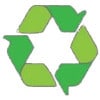
Greening Efforts Strengthening Jewish Life, Identity, and Institutions
During this last seven-year shmita cycle, UJA-Federation of New York has invested nearly $2 million in Hazon’s Jewish Greening Fellowship. It was brought into existence by Adam Berman and Rabbi Deborah Joselow and it has been very ably led, in succession, by Rachel Jacoby-Rosenfeld, Dr. Mirele Goldsmith and now Becca Linden. This week’s Leading Green gathering at UJA-Federation of New York was a moment simply to note how much has been accomplished. JGF organizations have raised roughly $3.6 million from mostly state and local sources for green improvements and programs, and they will save – at minimum – at least $2 million over the next decade through increased energy efficiency and reduced waste. So just in financial terms, the program has been remarkably successful, at a time of significant financial stress across Jewish non-profits. But the financial impact is only a part of it: 70 Fellows at 55 organizations have participated in leadership training, intensive workshops, and field trips that have enabled them to green their institutions and communicate how Jewish values are informing our response to this central challenge of our time. More than 600 people have participated in Green Teams, roughly 33,000 have participated in educational programs, and […]
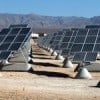
Become An Energy Maccabee
Hanukkah is a holiday about a small band of revolutionary activists who, against all odds, routed the Assyrian Greek Empire, retook control of the Temple in Jerusalem, and there witnessed an energy miracle: a vial of oil kept the Temple’s menorah aflame for eight days instead of one. In short, Hanukkah is a holiday about energy use, rededicating our buildings, and rebelling against the established system — the perfect holiday for all of us dedicated to greening our institutions and our lives. This Hanukkah we celebrate the rededication of buildings with cleaner and more efficient ways of using energy, like the following: Temple Israel Center of White Plains uses solar energy to power its ner tamid, the eternal light at the front of the sanctuary that recalls the ancient menorah rekindled on Chanukah. With the help of the JGF, staff members from JASA Brighton Beach, Friedberg JCC, Hebrew Institute of Riverdale, and Temple Israel Center of White Plains recently attended a GPRO training on how to retrofit and maintain a green building. For more information on future GPRO trainings, visit Solar One. On November 20, JCC of Staten Island rededicated itself to using clean energy by installing a 103 kW […]

Compost Team
by Ann Berlstein, Greening Fellow, Teacher, Solomon Schechter School of Westchester When the Schechter Westchester Lower and Upper Schools selected “reducing waste in the lunch program” as our project for the Jewish Greening Fellowship, we were thinking about garbage. Trash. Piles of empty, half-pint milk cartons. Mounds of uneaten pizza slices. We were not focused on giving struggling students a reason to turn up at school every morning or unearthing hidden leadership skills in fourth graders. So nobody was more surprised than I was when our trash-reduction project became the vehicle for several third and fourth graders to organize themselves into a student-run “compost crew,” complete with job assignments, checklists, badges, protective gear, and – most importantly – “cool kid” status in the halls of the Lower School. In the upper elementary grades, it seems, kids look up to kids with clipboards and big shovels. And for some of our students, that recognition could not have come at a better time. At the time we decided to recruit students to work on the snack-composting plan, one of our boys – let’s call him Aaron – was going through a hard time. He often did not want to come to school […]
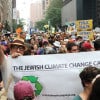
Thousands of Jews March for Climate Action and Keep Going
Thousands of Jews from over 100 communities joined 400,000 people of all faiths in the People’s Climate March on September 21. It was an inspiring day that revealed the public’s concern about climate disruption, and growing understanding of the need for serious action. We need to keep the pressure on political leaders at every level, from local communities to the US Congress, to follow through on measures that will limit greenhouse gas emissions from fossil fuels and accelerate the transition to renewable energy. Here are some ways that you can engage your members who were inspired by the March and are ready to keep going: Educate Your Community Hannukah, the festival of light, is a great time to learn about different sources of energy and their impact. COEJL’s Hannukah Energy Scavenger Hunt is a fun place to start. Show Disruption, the exciting film that tells the story of the People’s Climate March. Do your members know what you are doing to make your organization more energy efficient? Share your progress with your board of directors and in your newsletter. If you need to start tracking your energy use, learn how to use EPA’s Portfolio Manager. Help Members Take Concrete Action […]
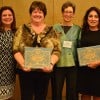
JGF Celebrates Graduation of 2013-2014 Cohort
Fellows, senior leaders, and friends and family from 20 organizations, celebrated the completion of the JGF’s third cohort at a moving ceremony at UJA-Federation of New York on September 15. (Pictured receiving certificates: Cindy Dolgin, Teri Fields, and Eileen Bohrer of Solomon Schechter of Long Island.) Mirele Goldsmith, Director of the JGF, congratulated the group, saying, “You have demonstrated that Jewish communities, with other priorities and limited resources, can lead the way in taking action to solve the climate crisis. You can further your missions, help the bottom line, and also fulfill your moral responsibility to leave a livable earth for our children. Perhaps even more important, you have taught the people who look to you for direction – in this cohort alone that’s over 85,000 people – that they don’t have to ignore the problem out of fear and despair. That although what each of us can do alone is a drop in the bucket, what we can do together can fill the bucket. You have demonstrated the power of Jewish community!” This was the most varied cohort to date, including 9 congregations, 3 day schools, social service agencies, a camp, JCC, and even an institution of higher education […]

Coming Together for Everyone’s Future
When I started my internship at Hazon at the beginning of the summer, I had no idea what the People’s Climate March was, let alone know that I would be devoting most of my time to it. For those of you who haven’t heard about the People’s Climate March yet, it’s being held in Manhattan on Sunday, September 21, 2014, two days before the emergency climate summit called by UN Secretary-General Ban Ki-moon, in which he is urging world leaders to take serious action against climate change. The March will be a platform for all of us to show our support for a treaty to prevent climate change and to put pressure on leaders who can make a difference. Over the past ten weeks, I have put together a website for the Jewish Climate Change Campaign filled with content I helped create about the March, listened in on numerous conference calls, and emailed countless people about why they should participate. Through all of this, I have come to care deeply about this cause and this March. I have seen how Jewish people involved in different communities have come together, united for this one cause and the chance to change the course of […]
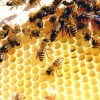
ReSources You Can ReUse!
Rosh Hashanah is a great time to educate about bees. We depend on these pollinators for much of our food, and bees are in trouble for a variety of reasons. Check out Hazon’s flyer you can use, Jewish sources, 15 Facts About Bees from National Geographic, and NYC Beekeepers Association, for more information. And check out Kane Street Synagogue’s annual honey fundraiser for inspiration. Check DSIRE: Database of State Incentives for Renewables and Efficiency for funding opportunities across the US, listed by state. Need to make the business case for planning for climate change to your board? Jewish organizations, like governments, are prone to “short termism.” Risky Business: The Economic Risks of Climate Change in the United States warns that it is time to factor climate change into long-term business decisions and create a plan to mitigate your exposure to risk. Looking for a great way to engage teachers and students in environmental sustainability? Check out this guide to organizing a School Green Day.

Can You Afford Going Green?
“We can’t afford it.” That’s a common response when I suggest that Jewish organizations reduce waste and pollution, protect health and safety, and demonstrate leadership in the transition to a greener world. But the truth is – you can afford it. It’s Free! Greenburgh Hebrew Center is saving money on electricity this summer, and reducing greenhouse gas emissions, by turning off the air conditioning in the social hall and holding the Shabbat kiddush in the lobby. Another no-cost step is to switch to green cleaning products that protect your members from toxic chemicals and reduce water pollution. They cost less because they are sold in concentrated form. The Jewish Community Relations Council, which rents office space in Manhattan, worked with the building management company to make the switch to green cleaning. Now all tenants benefit at no extra cost. Get a Grant. Kane Street Synagogue replaced 200 incandescent bulbs in the historic sanctuary with LED bulbs with the help of a generous subsidy from Con Ed. The congregation will recoup the cost in one year and reap the savings in electricity costs for the 10-15 year lifespan of the bulbs. Find out about opportunities for your organization to receive free […]

JGF ReSources You Can ReUse – June 2014
Don’t reinvent the wheel! There are many resources available for Jewish gardening activities and curricula: Eco-Judaism: Examining the Relationship Between the Environment and Judaism, Alumot Resource Manual, Ze’raim Community Gardening Resource Manual, Ginat Ha’yeladim Jewish Children’s Gardening Curriculum, Spirit in Nature. FJC’s Green Building Loan Fund (GBLF) helps non-profit organizations to reduce their use of fossil fuels. The GBLF provides five-year loans for projects that increase fuel efficiency in heating, cooling, electrical use and transportation. Renewable energy projects including solar electric, solar water heating, wind turbines and geothermal heating systems, are also eligible. On September 20 or 21 hundreds of thousands of citizens will participate in the People’s Climate March in New York City. The Jewish Climate Change Campaign is working to mobilize the Jewish community. Sign on now as a “participating organization” and publicize the March. Contact mirele.goldsmith@hazon.org for more information. Across North America, a vibrant Jewish environmental culture is flourishing, attracting young adults and inspiring many people to live more sustainably. How does your greening initiative fit into this exciting development? To find out, read Gleanings from Our Field: Green Hevra Report 2014, which explores the state of this growing field.



